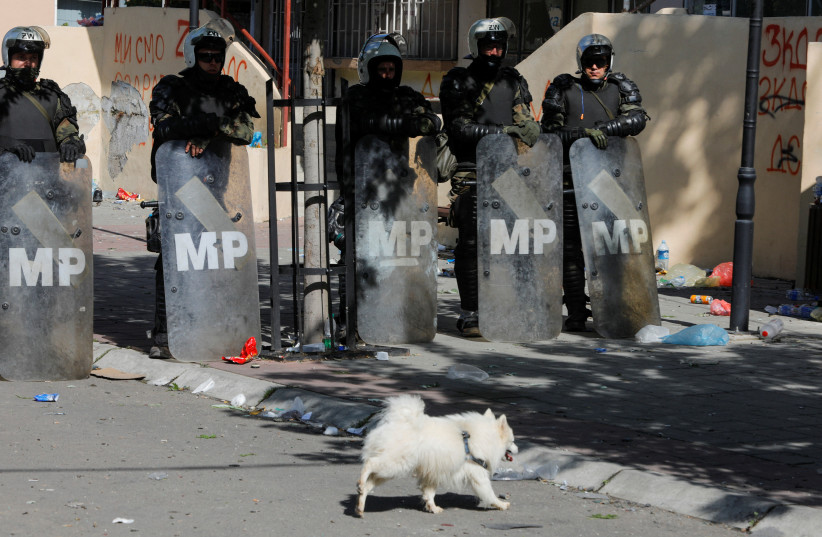NATO troops secured a town hall in Kosovo's Zvecan and the alliance said on Tuesday it would send more soldiers to the region, a day after 30 NATO soldiers and 52 protesters were hurt in clashes and the EU and US urged a de-escalation of the violence.
Unrest in the region has intensified since ethnic Albanian mayors took office in northern Kosovo's Serb-majority area after April elections that the Serbs boycotted, a move that led the US and its allies to rebuke Pristina on Friday.
NATO said in a statement it would send additional forces to Kosovo to curb the violence, but provided no details of when this would happen or the number of soldiers involved.
Dozens of NATO troops secured a municipal building in the Kosovo town of Zvecan, where the previous day 30 NATO soldiers and 52 Serb protesters were injured in clashes.
Several ethnic Serbs gathered in front of the building but the situation was calm, a Reuters reporter said, as soldiers from the United States, Italy and Poland stood by in anti-riot gear.

On Monday, Serb protesters in Zvecan threw tear gas and stun grenades at NATO soldiers. The NATO force, known as KFOR, said 30 of its soldiers were hurt in the clashes. Serbian President Aleksandar Vucic said 52 Serbs were injured.
Ethnic groups clash throughout the region
In another Serb-majority town, Leposavic, an ethnic Albanian mayor was unable to leave his office for more that 24 hours because of protesters outside, media reported.
EU Foreign Policy Chief Josep Borrell condemned Monday's violence "in the strongest possible terms."
"The violent acts committed against @NATO_KFOR troops, media, civilians and police are absolutely unacceptable," Borrell said on Twitter.
Tensions have risen since ethnic Albanian mayors took office in northern Kosovo's Serb-majority area after elections the Serbs boycotted.
Kosovo authorities have blamed Vucic for destabilizing Kosovo. Vucic blamed Kosovo authorities for causing problem by insisting on installing new mayors.
"In a democracy there is no place for fascist violence—no appeal from ballot to bullet," Kosovo Prime Minister Albin Kurti said on Twitter late on Monday.
Vucic is due to meet ambassadors of the so-called Quint group - the United States, Italy, France, Germany and Britain - in Belgrade and is later due to meet the ambassadors of Russia and China to Serbia.
Italian Foreign Minister Antonio Tajani told RAI public radio he had spoken to Vucic and Kurti on Monday evening.
"I invited everyone to be calm ... abandon violence, and I hope they listened, both showed great willingness, we'll see."
Ethnic Serbs, who are in the majority in Kosovo's north, have never accepted its 2008 declaration of independence from Serbia and still see Belgrade as their capital more than two decades after the Kosovo Albanian uprising against Serbian rule.
Ethnic Albanians make up more than 90% of the population in Kosovo as a whole, but northern Serbs have long demanded the implementation of an EU-brokered 2013 deal for the creation of an association of autonomous municipalities in their area.
Serbs refused to take part in local elections in April and ethnic Albanian candidates won the mayoralties in four Serb-majority municipalities - including North Mitrovica, where no incidents were reported on Monday - with a 3.5% turnout.
"KFOR will continue to take all necessary measures to ensure a safe and secure environment and freedom of movement for all communities in Kosovo, in accordance with its mandate," the NATO force said in a statement.
Russia, which has long had close ties with Serbia and shares its Slavic and Orthodox Christian traditions, called on Tuesday for "decisive steps" to quell the unrest in Kosovo.
The Russian foreign ministry urged "the West to finally silence its false propaganda and stop blaming incidents in Kosovo on Serbs driven to despair, who are peaceful, unarmed, trying to defend their legitimate rights and freedoms."
Moscow helped block Kosovo's bid for UN membership at Belgrade's request.
The United States ambassador to Kosovo Jeffrey Hovenier blamed Pristina for fueling tensions in the north by moving Albanian mayors to their offices on Friday despite Serb opposition.
Washington, the most outspoken advocate and supporter of Kosovo independence, decided to cancel Kosovo's participation in a military drill after Pristina refused to withdraw the mayors and its police forces from the north.
"We're thinking through other implications as well," he told reporters.
Masked men in the town of Leposavic close to Serbian border smashed the windshield of a car with an Albanian license plate marked as "A2, CNN affiliate," a Reuters reporter who witnessed the incident said. A separate car belonging to another media outlet was smashed as well. No one was injured.
'Too much violence'
EU foreign policy chief Josep Borrell urged Kosovo and Serbian leaders to find a way to de-escalate tensions through dialog.
"We have too much violence already in Europe today, we cannot afford another conflict," Borrell told a news briefing in Brussels.
Kosovo authorities have blamed Serbian President Aleksandar Vucic for destabilizing Kosovo. Vucic blames Kosovo authorities for causing problems by installing new mayors.
"In a democracy there is no place for fascist violence—no appeal from ballot to bullet," Kosovo Prime Minister Albin Kurti said on Twitter late on Monday.
After meeting ambassadors of the Quint group - comprising the United States, Italy, France, Germany and Britain - in Belgrade, Vucic said he had asked that Albanian mayors are removed from their offices in the north.
Kosovo President Vjosa Osmani said criminal gangs, supported by Vucic, aimed to destabilize Kosovo and the entire region.
On Monday, Serb protesters in Zvecan threw tear gas and stun grenades at NATO soldiers, leaving 30 NATO troops hurt, along with 52 Serbs.
"Violent acts against citizens, against media, against law enforcement and KFOR (NATO's Kosovo) troops are absolutely unacceptable," EU's Borrell said.
